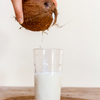The Stress-Gut Connection

When it comes to gut issues and the gut healing process, there is one thing that often gets neglected.
Stress management.
All too often I see patients following dietary and supplemental advice to a tee, yet when it comes to addressing and supporting their mental health and strategies around stress management it is often met with, 'I forgot to do that', 'it doesn't work for me' or 'i'm not stressed' (this last one is tricky as it presents differently for so many of us and because we all have our own definition of stress).
The truth is, the body has a limited number of physiological and biochemical ways to express stress, despite it having very broad triggers and manifestations.
If you are wondering if stress could be contributing to your gut health issues, the answer is yes, it could be.
In this blog, well look at how stress can affect the gut, conditions that have been linked to stress and the techniques to improve your mind-gut connection.
The major effects of stress on gut health include:
- Alterations in gastrointestinal motility (movement)
- Increase in visceral perception (the way you feel sensations in your body)
- Changes in gastrointestinal secretion
- Increase in intestinal permeability (leaky gut)
- Negative effects on regenerative capacity of gastrointestinal mucosa and mucosal blood flow (an impact on healing ability)
- Negative effects on intestinal microbiota (your gut bugs) (1)
The variations in these gut functions means a stress has been linked to the following conditions:
Inflammatory Bowel Disease (Ulcerative Colitis and Crohn's Disease)
Psychological stress (especially chronic) (2), adverse life events, and depression have been found to be exacerbating factors in the pathogenesis of inflammatory bowel disease (IBD) as well as contributing to the risk of relapse (1).
Stress affects IBD through a variety of mechanisms in the systemic and gastrointestinal immune and inflammatory responses including alterations in bacterial-mucosal floral interactions, activation of mucosal mast cells (immune), and peripheral release of corticotropin releasing factor (stress hormone).
The symptoms of IBD may be exacerbated by the effects of stress on gut motility, fluid secretion and a shift toward increased expression of proinflammatory cytokines in colonic mucosa (1,3).
Small Intestinal Bacterial Overgrowth (SIBO)
Firstly, if you are not sure what SIBO is, this is a must read.
Stress and its hormones when released into your bloodstream a type of cleaning action in the gut called the migrating motor complex (MMC) stops, or at least works less efficiently.
The MMC is an important protective factor against developing SIBO as it is a way of sweeping residual undigested food and other matter through your GI tract between meals. Without it bacteria are allowed to build up and cause food to stagnate, which ferments and further feeds the bacteria in your gut (4).
An antibody called Secretory Immunoglobulin A (IgA) serves as the first line of defense in your gut protecting your intestinal wall from toxins and pathogenic microorganisms. Stress suppresses IgA which decreases its ability to block these invaders from accessing the receptors in your gut lining, trapping them in mucus and removing them from your gut (5).
Stress hormones and substances involved in the stress response, such as cortisol and catecholamines, promote the formation of biofilms by helping pathogenic bacteria access the nutrients they need to stay in your body (6).
Irritable Bowel Syndrome (IBS)
Disruption of the brain gut-microbiota axis is a pathophysiological cause of IBS. The activation of brain-gut axis leads to the changes in visceral sensitivity, changes in the release of gastrointestinal hormones and neurotransmitters, increased expression and release of proinflammatory cytokines, changes in the gastrointestinal motility and gut microbiota (1).
Gastroesophageal reflux disease (GERD/GORD)
Stress causes the aggravation of GORD symptoms due to inhibition of the lower esophageal sphincter and increased sensitivity (perception) to acid. It has been found that when stressed, the amount of reflux does not always increase, but the probability of feeling heartburn increases. Studies have shown that stress reduction may lead to an improvement of GORD symptoms (1).
Peptic Ulcer Disease (PUD)
It is known that Helicobacter pylori and nonsteroidal anti-inflammatory drugs (NSAIDs) are causes of PUD, but there have also been studies supporting stressful life events such as divorce or separation, associated with PUD development. Stress exposure may contribute to PUD by impeding the gastric and duodenal defences against the damage induced by an attack from acid and pepsin damage (1).
In fact, psychological stress increased the incidence of peptic ulcer and has similar effects on ulcers even if there was no H. pylori infection or use of NSAIDs (7).
Low stomach acid (hypochlorhydria)
The activation of the sympathetic nervous system (fight/flight) has been found to be responsible for stressor-induced reduction in gastric acid secretion, with activation of the parasympathetic nervous system (rest/digest) enhancing gastric acid secretion (8).
A reduction in gastric acid secretion in your stomach is important to kill ingested bacteria before it enters your small intestine. Allowing bacteria to survive can increase your risk of PUD via H. pylori as well as SIBO (9).
Change your gut bacteria
Stress alters your gut microbes, due to the stress responses effect on gastrointestinal functions like gastrointestinal motility and mucous secretion, as well as secretory components of mucosal immunity, like sIgA.
For example gastrointestinal mucus is also a known substrate for bacterial growth, where there is a reduction in mucous secretion, common and beneficial species like Akkermansia muciniphila that degrade mucins for energy (their food) will be be altered (8).
Leaky gut (intestinal permeability)
Studies have revealed effects of stress-induced permeability changes and intestinal secretion. Potential impact of stress-induced intestinal barrier dysfunction on health. Stress, via signals from the central nervous system, leads to altered release or response to neuroendocrine factors (such as corticotropin-releasing hormone) in the intestinal mucosa.
Such factors may act directly or indirectly on the gut lining cells, inducing barrier dysfunction and uptake of proinflammatory material (e.g., antigens, toxins, infectious agents, and their products) from the gut lumen. The resultant inflammation causes disability and increases stress, which further amplifies the defect (10). When it comes to treating a leaky gut, stress management is a must!
6 of the best stress management techniques from a gut specialist.
Everyone is different and it's often a matter of trying and seeing what works for you. Some options include:- Identify stress triggers and modifying / avoiding exposure to them when and where possible.
- Getting adequate sleep, as this increases resilience to stress.
- Vagus nerve stimulation (increasing vagal tone) through humming and deep belly breathing (11).
- Mindfully listen to music, as in avoid multitasking with music playing/having it in the background. Sit and listen.
- Exercise everyday, whether this be incidental or deliberate exercise, movement is a powerful tool.
- Supplementation can assist your body's biochemistry in coping with stress nutritional options such as magnesium, B vitamins and herbs like Withania Somnifera are some options. I strongly encourage seeing a practitioner for this option. Not all magnesium, B vitamins and herbal formulations are made the same (quality, form etc) and assessment for the right supplement as well as ensuring your safety is important.







